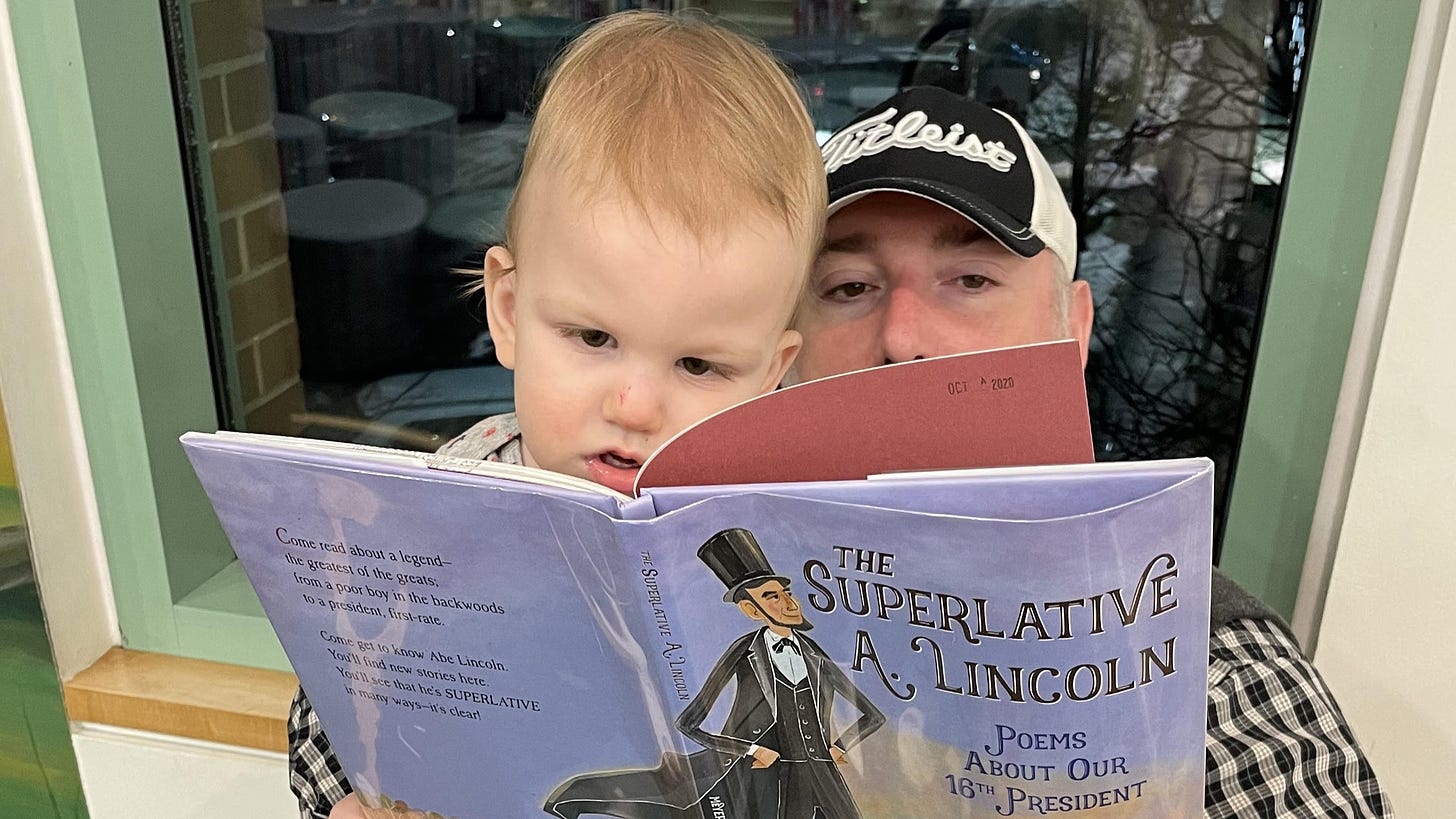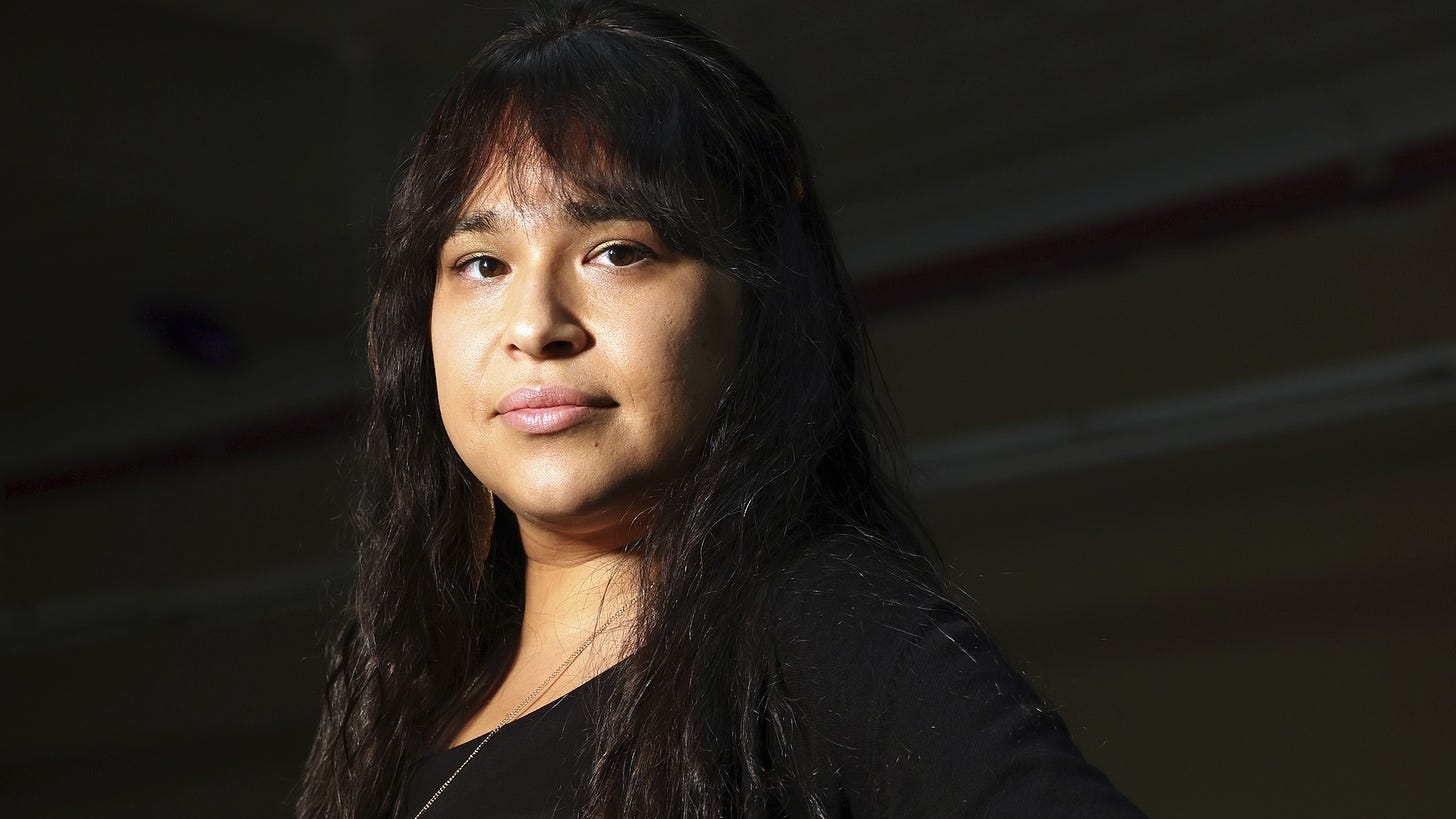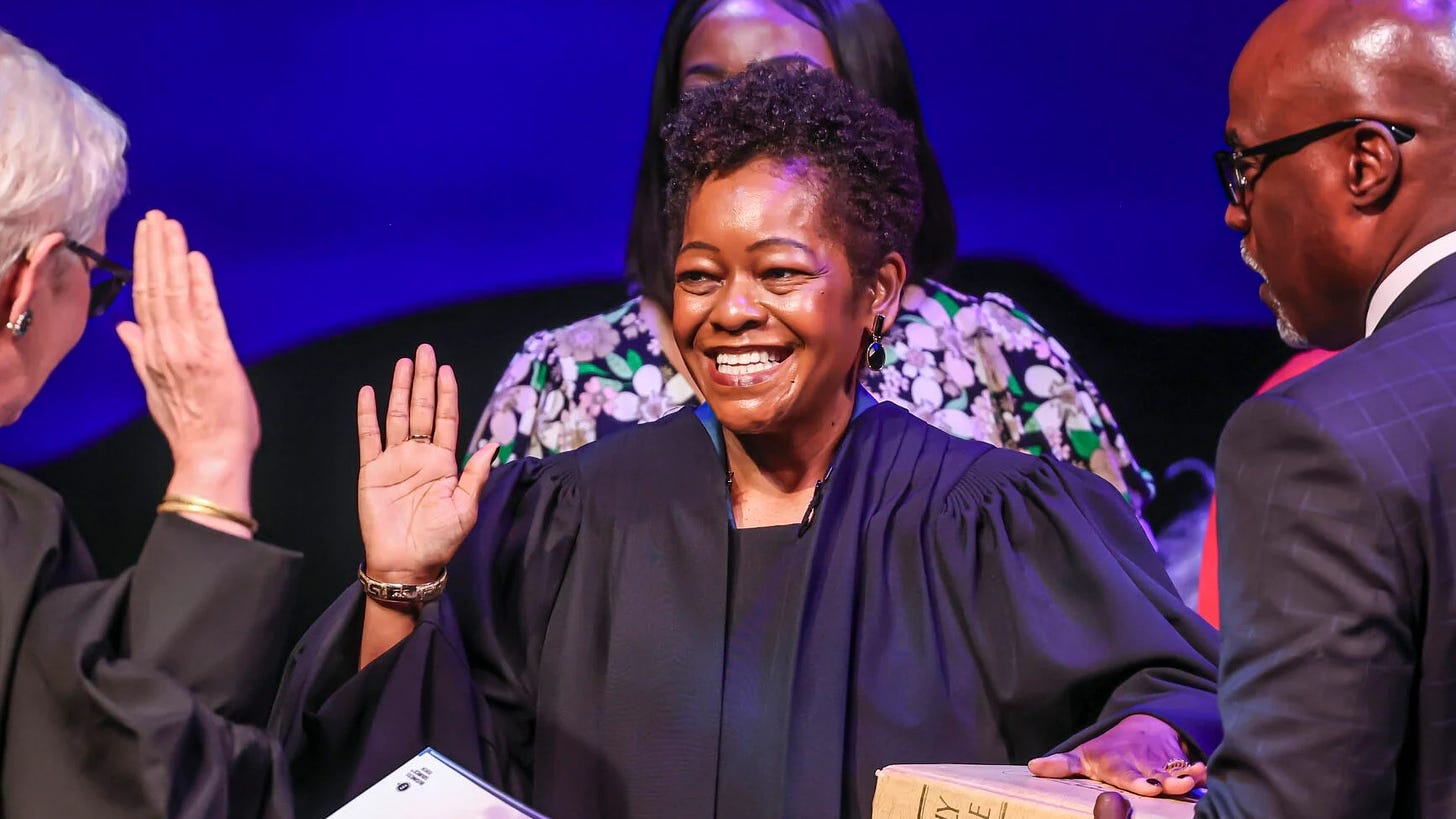THE ILLINOIZE: Monday Free for All...Allowing felons to change their name...Should the Bears get a tax break?...The new faces on the Illinois Supreme Court
January 30, 2023
Good morning, Illinois.
Not politically related, but we’re trying our best to raise him right.
The House is scheduled to be in this week Tuesday, Wednesday, and Thursday. Like the Senate, there are no committees formed yet. The Senate is out. Governor Pritzker cuts the ribbon at a new student center at the College of Lake County Lakeshore campus in Waukegan at 11.
Thanks for all of your support. If you aren’t yet a paid subscriber, please join us. It’s just $99 a year or $9.99 per month.
Let’s get to it.
YOUR THURSDAY FREE FOR ALL
(note: we’re not responsible for paywalls and restrictions from other news outlets)
SOME OF OUR TOP LINKS FROM LAST WEEK
Illinois poised to lift restrictions on felons who want to legally change their names (Chicago Tribune)
Reyna Ortiz hopes that one day soon she will be able to show her ID when required without creating confusion because the card has a man’s name on it.
A transgender woman, Ortiz has attempted to legally change her name to match her female identity but has been unable to do so because of an Illinois law that prevents name changes by anyone convicted of identity theft.
Ortiz was convicted on that charge about 20 years ago after she says she committed fraud in an effort to pay for gender-affirming surgery.
Legislation now on Gov. J.B. Pritzker’s desk would loosen restrictions for people with past felony convictions who want to legally change their names. The measure passed in the Illinois Senate during the lame-duck session earlier this month, with five Democrats voting no, after being approved with bipartisan support in the House in 2021.
A sometimes contentious debate preceded the Jan. 10 vote in the Senate, with opponents arguing the bill would allow felons to escape scrutiny and commit more crimes.
Supporters countered that the measure is intended to protect victims of human trafficking, as well as help those in the transgender community like Ortiz.
“Every time I pull my ID out people are like, ‘you’re a man?’ I’m a woman. I live as a woman. I look like a woman. I’m a transgender woman,” said Ortiz, 42, who lives in Chicago’s western suburbs. “There’s so many trans women walking around with IDs that don’t match their gender identity and that opens us up to various degrees of systemic discrimination.”
The bill removes a lifetime ban on name changes for people who have been convicted of identity theft, as well as for those on state registries for convictions on offenses including murder, arson and various sex crimes. For all other felonies, the bill lifts a 10-year waiting period from the completion of a sentence for people to change their names.
Judges would have ultimate say over approving name changes for people convicted of felonies that had been subject to the lifetime ban, and the measure would allow county prosecutors to object to those name-change petitions. In those cases, the petitioners would have to convince judges that they want to change their name because they’re transgender, were victims of human trafficking, for religious reasons or because they got married.
Related: ‘Omnibus’ health care bill passed amid criticisms (Capitol News Illinois)
Editorial: Pritzker's windmill flip will be a flop in much of Illinois (Champaign News-Gazette)
Pride and joy of Illinois? Leading state business group makes case for Bears tax break (Daily Herald)
As a draft of legislation that would give the Chicago Bears a massive property tax break at Arlington Park emerges in Springfield, the NFL franchise has a major backer in its corner.
Illinois Chamber of Commerce President and CEO Todd Maisch's lobbying pitch to legislators is practically a version of the "Bear Down, Chicago Bears" fight song, which famously proclaims the team as the "pride and joy of Illinois."
Though the chamber's support of the proposed Payments in Lieu of Taxes financing mechanism would suggest at least implicit support of a Bears' suburban relocation, Maisch said he's not taking sides between Arlington Heights and Chicago.
"We think it's really, really important that the Bears stay in the state of Illinois, and there's no reason they can't be here. I would love it if they could find a way to work it out with the city of Chicago, but it doesn't sound like that's going to happen," Maisch said. "It's gonna be difficult. It's gonna be messy. Let's be honest."
A couple of facts of life: 15 Senators and 28 Representatives live in the City of Chicago and probably a dozen more that represent a part of the city. Passing a bill to encourage the sports institution of Chicago to move to the suburbs seems like political suicide. Good luck building a suburban Democrat + downstate Republican coalition on that baby.
Secondly, and I’m no expert, but it appears the state has hardly touched any of the principal on the 2001 Soldier Field renovation. So, yeah.
Related: Chicago Bears' stadium subsidy plan for Arlington Heights surfaces (Crain’s Chicago Business)
Illinois Supreme Court marks demographic shift (Bloomington Pantagraph)
When Illinois Supreme Court Justice Mary Kay O’Brien introduced her 5-year-old son to then-Justice Thomas Killbride years ago, she recalled him saying to her, “Mom, I didn’t know boys could be judges.”
Growing up, he had only known women judges like his mom.
Now, the ascendance of O’Brien and other women to the state’s highest court could be changing the image of who can be a judge for the entire state.
The November election saw the demographics of the Illinois Supreme Court shift to a majority female court for the first time.
O’Brien was elected from the court’s 3rd District while Justice Elizabeth Rochford was elected to serve for the 2nd District. Both won heavily contested races in districts that include the Chicago suburbs and portions of rural northern Illinois.
They join Chief Justice Mary Jane Theis, Justice Joy Cunningham and Justice Lisa Holder White to form a 5-2 female majority on the state Supreme Court, which also includes Justices P. Scott Neville, Jr. and David K. Overstreet. The previous record for most female justices serving at one time was three.
Illinois is one of four other states that is a representative court, meaning that the justices are elected by members of their respective districts. The state is also unique because it requires candidates to declare a party affiliation.
Following the results of the 2020 U.S. Census, state lawmakers voted to redistrict the Supreme Court’s district boundaries for the first time since 1964.
The change came after Democratic Justice Thomas Kilbride lost his bid for retention in 2020. Democrats, with a slim 4-3 majority at the time, feared they could lose control of the court without a more favorable map. The changes also helped even out population disparities between the districts that grew significantly over the past five-and-a-half decades.
POLITICAL POTPOURRI
Pritzker announces departure of Deputy Gov. Christian Mitchell (Crain’s Chicago Business)
Old State Capitol preservation and renovation efforts get $15 million investment (State Journal-Register)
State Rep. Lance Yednock blasts hospital closing, says hospital could face fines (Shaw Media)
Lightfoot urges General Assembly to do its share to bail out city pension funds (Chicago Sun-Times)
Kam Buckner presents himself as the 'pro-business progressive' in new tax plan (Crain’s Chicago Business)
Pritzker endorses 22 candidates for City Council (Crain’s Chicago Business)
Illinois Superintendent of Education Carmen Ayala Reflects On Pandemic, Addressing Inequities In Education (WTTW)
Here are the committee assignments for freshmen of Illinois' congressional delegation (Crain’s Chicago Business)
Clusters of pandemic relief loans went to the same Chicago addresses, including homeless shelters (Chicago Sun-Times)
McDonald's exec slams 'costly and job-destroying' move to pay fast-food workers $22 an hour (Crain’s Chicago Business)
Opinion: Give gun owners a tax break for getting rid of their weapons (Chicago Sun-Times)
JOIN US














